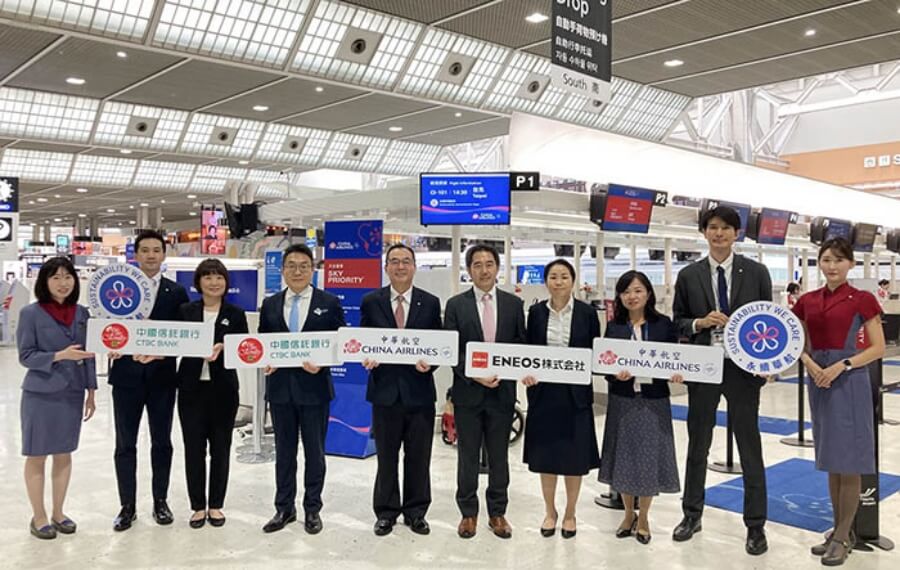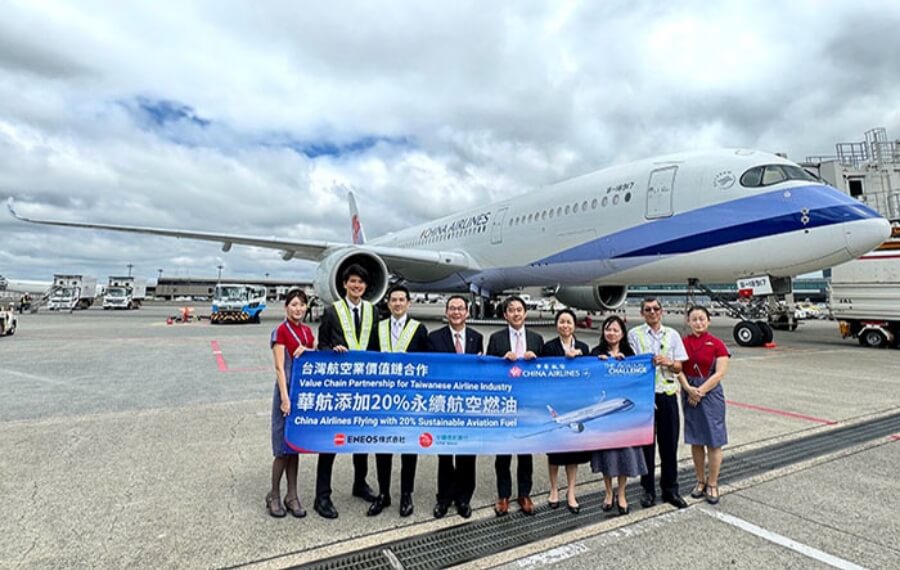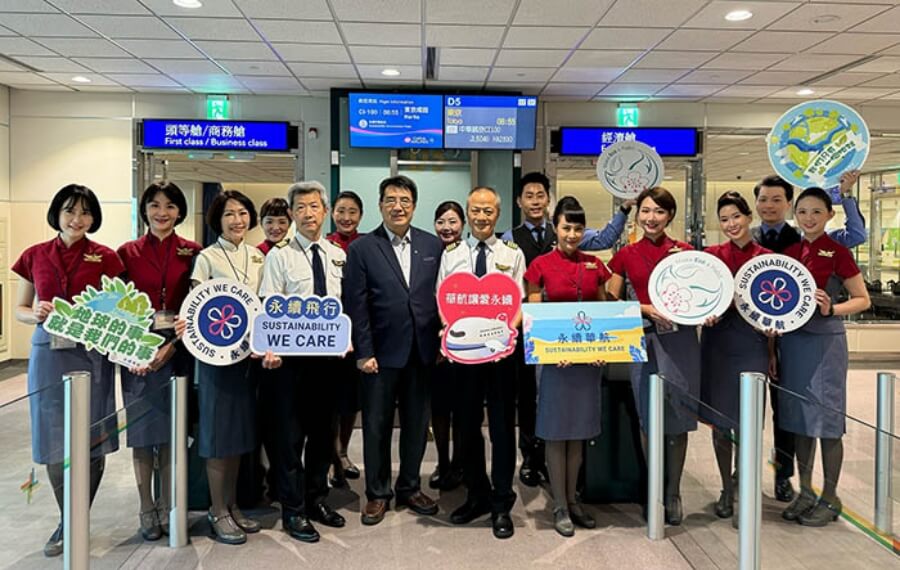Today (9/4) marks the third year Taiwan-based China Airlines is participating in The Aviation Challenge (TAC) from the SkyTeam alliance with demonstration flights CI100/CI101 between Taoyuan and Tokyo (Narita) operated by the A350-900 next-generation fuel-efficient aircraft. The flights are a continuation of the two previous flight challenges, putting the sustainability philosophy of China Airlines into practice. The use of Sustainable Aviation Fuels (SAF), support for circular economy, collaborating with value chain partners, and implementing of carbon-reducing operations both in the air and the ground, as well as carbon offsetting demonstrate China Airlines’ commitment to sustainability.
Return flight from Tokyo to Taiwan fueled with 20% SAF in partnership with CTBC Bank and ENEOS to achieve low-carbon flight
The use of SAF has long been promoted by China Airlines. SAF was first introduced on ferry flights for new aircraft deliveries in 2017 and was used for the first time on passenger flights in 2023. This year a new milestone in Taiwanese airline industry was reached with the introduction of one-time value chain collaborations on passenger flights. CTBC Bank, China Airlines’ co-branded credit card partner and a corporate customer, sponsored the use of 20% SAF on the CI101 Tokyo (Narita) - Taoyuan flight to support low-carbon aviation. Both companies have passed review by the Science-Based Targets Initiative (SBTi) and have now embraced Net Zero by 2050 as their sustainability vision. By collaborating on the latest demonstration flights, both parties hope to promote energy transition in the airline industry and the development of low-carbon transportation.
According to information disclosed by international organizations such as the International Air Transport Association (IATA), sustainable aviation fuels can reduce carbon emissions by approximately 80% compared to traditional fuels. Japan's ENEOS Corporation, a long-term fuel supplier for China Airlines, not only participated in the SAF addition process but also collaborated with the airline on voluntary carbon offsetting, achieving net-zero carbon flights for all passengers and cargo on the CI100/CI101 flights. China Airlines and its partners are working together toward low-carbon operations.
Incorporating carbon reduction operations in air and ground to bring demonstration flights into everyday service
China Airlines drew on past eco-friendly practices to incorporate carbon reducing operations into everyday flights. Paper boarding passes will prioritize the use of Forest Stewardship Council (FSC) certified paper. Additionally, encouraging online check-in and mobile boarding passes to minimize paper usage in airport procedures. With in-flight services, travelers are encouraged to pick pure and green plant-based cuisine from Michelin Green Star restaurant Yang Ming Spring that have a lower carbon footprint than meat-based foods, and electronic menus have also been introduced. In Economy Class, eco-friendly utensils made from reclaimed stainless steel are now being progressively rolled out on all routes. Pillow covers, headrest covers, lids, plastic cups, toothpicks and amenity containers in the lavatories are now made from eco-friendly materials, and China Airlines has continued to promote the paperless Dynasty Sky Reading service as well. Encouraging travelers to read magazines and newspapers on personal mobile devices reduced the amount of physical reading materials carried aboard, reducing weight by more than 2,000 tonnes since the service launched.
The SkyTeam TAC was the first friendly co-learning competition for the airline industry focused on the development of sustainable design and operations. More than 465 innovative proposals have emerged since the event was first held in 2022. Last year’s competition saw major gains in carbon reduction performance with flights seeing on average a 19% reduction in their carbon emissions compared to the previous mouth. Up to 37% of ground-side equipment are now electrified as well. SkyTeam extended its TAC invitations to non-members this year and a record 24 airlines including member airlines took part, making it the largest in scale. The competition will hopefully inspire and lead to the sharing of innovative ideas between competitors to help reduce the environmental impact of air travel.
China Airlines is a longstanding supporter of ESG development through environmental protection, social responsibility, and corporate governance. This included being selected as a constituent stock of the Dow Jones Sustainability Indices (DJSI) - Emerging Market for eight consecutive years, winning the Taiwan Corporate Sustainability Awards (TCSA) ten times in a row, as well as the highest honor, Most Prestigious Sustainability Awards - Top Ten Domestic Companies Award. China Airlines continues to maintain its leadership position in sustainable development among Taiwanese airlines, actively integrating environmental and carbon reduction measures into actual flight operations, and steadily advancing toward net-zero carbon emissions and ESG sustainability goals.
- The Dynasty Sky Reading service went live in March 2022. Approximately 1,000 tonnes of physical magazines and newspapers were carried aboard flights each year before the service was launched.
- China Airlines Carbon Reduction Targets Passes SBTi Review, A First for the Taiwanese Airline Industry
- CTBC Bank Low-carbon Environment
- SkyTeam - The Aviation Challenge: how SkyTeam is uniting the industry to drive change through innovation
- SkyTeam - Who’ll win the SkyTeam Sustainable Flight Challenge 2023?
- IATA SAF Information - What is SAF?


